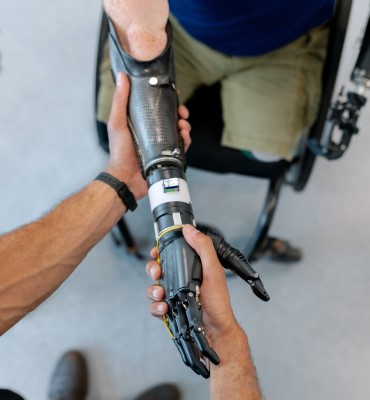
University of Bolton, Deane Road, Bolton. BL3 5AB
Tel:
Email:


“At the University of Bolton, we take great pride in providing a quality, supportive learning environment for our students.”
Professor George E Holmes DL | President & Vice Chancellor
“...tutors are very supportive and you’re not just a student ID number, at this university you are an individual with a name.”
Ellisse Vernon | BSc (Hons) Adult Nursing
Back to menu
Back to menu
Study with an Off-Campus Partner
Back to menu
Back to menu
University of Bolton, why we are the right choice
Location - Bolton, Greater Manchester

02/11/2021
Do you want to combine your love for engineering with the ability to design medical products that could save people’s lives? If so, a career in biomedical engineering could be just the thing you need! Here at the University of Bolton, our BEng (Hons) Biomedical Engineering degree can help you to achieve your dream career. Read on to discover more about the kind of doors this degree could open.

There are a number of exciting job roles in the field of biomedical engineering. Here are some examples:
An independent biomedical engineering consultant works with medical organisations and research institutions to offer recommendations and guidance. Their input can impact how a workforce is organised, what different types of equipment is used, and how processes are executed.
A manufacturing engineer is involved in the production and design of products, aiming to create high-quality goods at low prices. In the biomedical field, these products tend to be created for use within the healthcare sector. They can include imaging tools, prosthetic limbs, and hospital equipment. A manufacturing engineer with a biomedical engineering background can take a leadership position in designing these products or manage teams who create them.

A biomedical engineer may develop biomaterials, which can either be artificial materials or natural living tissue, for the human body to use. Nano implants, drug delivery, biomedical implant development, and tissue engineering are all areas that a biomaterials developer could work in. Biomaterials can be used to either replace or repair lost function to the body or to image and detect disease.
To give yourself the greatest chance of earning a top biomedical engineering salary, you need to start your journey by acquiring a top-quality degree. The University of Bolton’s BEng (Hons) Biomedical Engineering degree has been accredited by the Institution of Mechanical Engineers (IMechE) and the Institute of Physics and Engineering in Medicine (IPEM) under licence from the UK regulator, the Engineering Council. With a reputation for being friendly, inclusive, and supportive, you can be sure of an environment that is designed to help you thrive. Our location in Greater Manchester also gives you access to strong industry links and an exciting social scene.
If you have any questions, send an email to UGadmissions@bolton.ac.uk or call us on +44 (0)1204 900 600. We are here to help.
You won’t have to wait until next September either! Why not take a look at our university courses starting January to find out more?